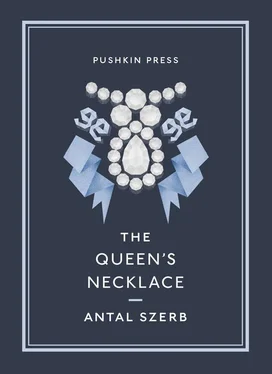The élégant no longer drops the names of his aristocratic friends and high-born mistresses. He speaks of his solitude, in which he busies himself with chemistry, but generally he says little. A barely discernible smile of mockery sits on his lips; his face wears a distant, dreamy look; he seldom stays long, leaving early and without fuss. But the women are even more advanced: the only words they utter are ‘ délicieux ’ and ‘ étonnant ’, spoken with a studied simplicity and indifference. In a man they admire délicatesse . Mere eloquence is out and the ‘art of conversation’ is in. Very little wine is taken, only water. Parisians speak much more softly than provincials. They keep themselves trim, and should they by chance begin to put on weight, drink vinegar.
The new style expresses itself in déshabillé rather than formal dress. Men now carry walking sticks rather than swords. Questions of honour are less of a concern than in previous generations, and duelling is much rarer. Where once people flaunted their vast wealth, they now boast of being on the verge of bankruptcy. Black clothing is now the fashion, and the extraordinary pomp and splendour of the court of Louis XV is steadily being pushed out.
After all this, even had Mme de Campan had not written her memoirs, we would still have guessed: “This Anglomania had reached such a pitch that Paris was now indistinguishable from London. The French, formerly imitated by the whole of Europe, were now become a nation of imitators … Since the trade agreements concluded under the peace treaty of 1783 not only carriages, but everything from ribbons to common earthenware were of English manufacture.” Young men wore tails and discussed the constitution, the upper house, the lower house, the balance of power and Magna Carta.
And what was the meaning of all these trifles? The end.
However bombastic that may sound, it really was the end — the end of aristocratic culture. Its ideal, savoir vivre , the art of living, had reached its zenith in the Court of Louis XV and the Paris of his time, and been unable to develop any further. People had by then become so distinguished, so refined and so perfect that now the great baroque expressions of that distinction, its classical pomp and dignity, had to be renounced. It was followed by charm and nuance, in that age of the art of delicate little things, the rococo. And then, by the closing years of the reign of Louis XVI, even that was too highly-coloured, too loud; and gave way in turn to the mode for softly-spoken conversation and silence: in a word, ‘Anglomania’.
But those who saw this Anglomania as mere imitation failed to notice the social significance of its roots. By this stage the English, having concluded an alliance of the aristocracy and the upper bourgeoisie, and taken, by way of the slow but steady transformation begun in 1688, to the upper-middle-class way of life, had become as we have seen (or imagined) them ever since. Earlier, they had been the noisiest people in the world, as evidenced by the uproar and garrulousness of Elizabethan drama. In imitating the English, the French nobility was taking its cue not from another aristocracy but from a quite different section of society, the upper bourgeoisie. This was the moment when aristocratic culture over-reached itself.
In his writings on the sociology of power Max Weber asserts that every historical regime that is not rationally based rests on a hidden principle which he terms ‘charisma’—a kind of divine power or grace which one person is regarded by his fellows as possessing, and by reason of which he is obeyed. Such power depends on direct personal contact and thus cannot survive long — usually only until the death of the charismatic individual. To consolidate and perpetuate this power, the charisma must be ‘routinised’, institutionalised by substituting symbolic acts for the real thing. The early Carolingian kings, for example, still exercised such charismatic power over their people, while later French monarchs were merely invested with symbols of that sacred power by the act of coronation and anointment with holy oil. The allegiance paid by their subjects was no longer to some irresistible force emanating from the royal person, but to the institution of kingship as a surviving sanction against non-obedience.
The special ‘chosen’ nature of the charismatic individual’s power extends to his entourage, and so the concept of a nobility comes into being. In time, this nobility also becomes a mere institution, its power deriving not from itself but from the law that sanctions it.
In our earthly existence, everything living in time must obey time. Through time, everything wears out and ebbs away. Palaces fall into ruin, and the silk and velvet of formal dress fade. But ideas wear out too—“after many a summer dies the swan”—and with the passing of so many centuries the force of charisma also becomes attenuated. There were many ‘reasons’ for the demise of the French Monarchy, but if we take a longer view, from the sort of distance at which the details start to dissolve into one another, then perhaps this might emerge as the one fundamental reason that gathers all those details into one single causation. The charisma faded, people no longer felt the specially chosen nature of the King and his entourage, and neither the King himself or his nobility felt it either.
Very few people die of pure senility. Even very old people generally fall victim to illness or accident, but usually these are the sort of illnesses and accidents that in their younger days they would easily have survived. In the final analysis, one might say that time had simply finished with them. And so it was with the Ancien Régime.
The aristocracy, partly as the result of its own prolonged inactivity, and partly under the influence of intellectual trends, had, as we have already noted, lost its sense of vocation. It no longer believed in itself. Its desire was simply to s’encanailler , and this above all showed its bad conscience. Perhaps that might explain the significance of what Wahl considered one of the most important causes of the Revolution: that eighteenth-century France produced no great men of action. There were none, because the social arrangements were such that men of this type could emerge only from the old aristocratic families, but the loss of a sense of vocation among those families also meant the loss of their whole raison d’être —to produce leaders for the country.
But it was the singular misfortune of the monarchy that the last two kings before the Revolution, Louis XV and even more importantly Louis XVI, suffered from that same bad conscience. The latter’s kindly heart was filled with fine intentions, and his ministers with plans for reform. He was the first king in many decades who sincerely, from the goodness of his heart, wanted to help his people. That proved fatal. As Tocqueville once again observes in his great work: “Only real genius can rescue a prince who sets out to ease the lot of his people after a long period of oppression.” Such a course can lead only to even greater oppression — or to surrendering power altogether.
Tocqueville also suspected, but it was Wahl who showed with his mass of incontrovertible facts, that the Revolution broke out not because the Monarchy was especially tyrannical but because the last French kings were not tyrannical enough. They introduced arbitrary measures, but lacked the strength to see them through. There were no revolutions in other countries where abuses were far worse but where royal power remained strong, and perhaps one might have been averted in France too. That is of course a rather lazy expression — the casual and playful use of the historical ‘might have’. And yet there are so many moments in the approach to the Revolution when one feels that it might indeed have been avoided if only Louis XVI had behaved differently.
Читать дальше












